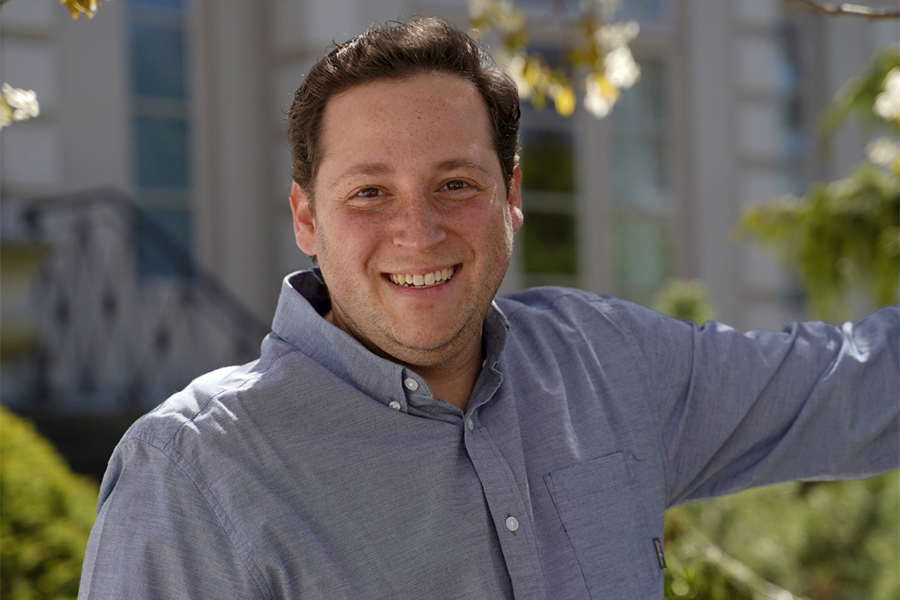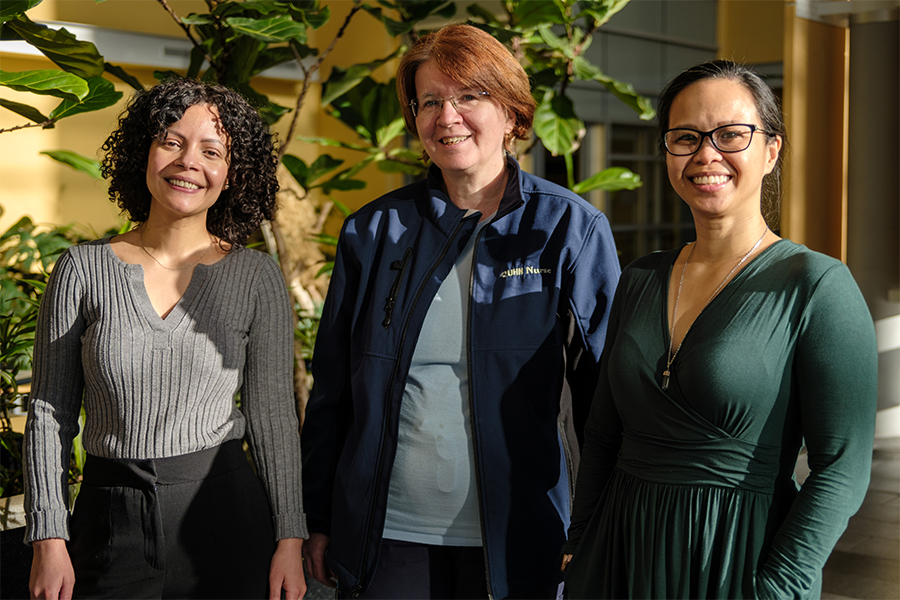During COVID-19, the proportion of clients preferring the chat service over the helpline has increased. Chat clients tend to be younger and require “in-the-moment” support. (Photo: UHN)
There has been a stark increase in demand for the toll-free helpline and instant chat support service at University Health Network’s National Eating Disorder Information Centre (NEDIC) over the past 18 months.
The COVID-19 pandemic has negatively affected many people’s mental health, with depressive and anxiety symptoms most frequently cited. One surprising effect has been a surge in the number of individuals suffering from eating disorders, particularly young people.
“Eating disorders tend to thrive in isolation and isolation has been a big part of the pandemic,” says Sara Marini, NEDIC’s administrative coordinator, and one of the direct client support (DCS) workers that answer the helpline and chat service.
Sara and her colleagues provide a range of resources and supports to those who contact them – from giving a teenager advice on how to broach a difficult conversation with their parents to assistance navigating the healthcare system in their local area.
“We think of NEDIC as a bridge – helping people take the next best step, which can vary quite dramatically depending on their circumstances,” says Sara.
Callers are anonymous and don’t need to have a formal diagnosis to use the helpline or chat service. The anonymity allows individuals to have an honest conversation, which is often the first step on their path to recovery.
Accessible across the country, the service is particularly valuable to clients in remote or underserved areas, whether they struggle with disordered eating themselves or are trying to support others affected.
Pre-COVID, the service annually had 3,500 clients. That figure climbed 40 per cent to 5,000 last year. NEDIC forecasts a jump to more than 7,000 this year, which would double pre-pandemic levels.
Addressing increased demand more challenging during pandemic
Besides social isolation, NEDIC attributes this spike to stressors that can cause unhealthy coping mechanisms, like the disruption of day-to-day routines and a continued sense of uncertainty. The closure or reduction of operations for many eating disorder programs has compounded the problem.
“We are hearing from people across the spectrum of experience: those who were in a good place of recovery before the pandemic triggered a relapse, and those who were never impacted by disordered eating and are now experiencing symptoms,” says Sara.
Addressing the escalating demand has been a challenge for NEDIC. COVID safety protocols meant that only one employee could work at a time in their office in Toronto General Hospital. Their helpline continued to operate at UHN, but DCS workers began to deliver instant chat services remotely.
“I didn’t have people immediately next to me or just down the hall that I could bounce ideas back and forth with or someone to run something past while I’m typing a chat response,” says Emily Huynh, a DCS worker on the chat service and NEDIC’s community engagement facilitator.
“That was a hard adjustment.”
There is no typical day at NEDIC. Calls and chats arrive sporadically, often in bunches. During COVID, the proportion of clients preferring the chat service over the helpline has increased; chat now amounts to two-thirds of total users. Chat clients tend to be younger and require “in-the-moment” support, rather than requesting information about resources and referrals.
“They are often in a place where they’re maybe starting to realize they have a problem, but they’re not really prepared to put a label on it yet,” says Sara. “They’re starting to explore what might be out there and we know how early intervention leads to better outcomes.”
To cope with what can be difficult and emotionally challenging work, the DCS staff – a mix of full-time and part-time employees, volunteers and students completing social work placements – have leaned on one another.
Expanded hours thanks to Telus Friendly Future Foundation
“There’s been a lot of checking in with each other outside of our workspace to keep each other in mind and know that we’re there,” says Emily. “We’ve created a virtual space where we can be silly and funny, exchange memes, catch up and talk about our days, and not necessarily about work.
“I think that has been really helpful.”
NEDIC recently expanded its hours of operation thanks to a $150,000 donation from the Telus Friendly Future Foundation. (Hours had shrunk in March 2020 due to COVID regulations.) The helpline and instant chat services now return to operate 9:00 a.m. to 9:00 p.m., Monday through Thursday, and 9:00 a.m. to 5:00 p.m. on Friday.
A pilot project launched in August with Beat, a United Kingdom-based eating disorder charity, also expanded chat-specific coverage on the weekends from 11 a.m. to 3:00 p.m. (NEDIC reciprocates support to Beat providing chat support to U.K.-based clients during their weekday evening times.)
The developing eating disorder crisis is unlikely to ease with pandemic restrictions, and NEDIC will continue to face the increased demand for their service one call (or chat) at a time.
World Mental Health Day on Oct. 10, is a reminder of the many pressures the pandemic has imposed on all aspects of mental health and how acutely resources, like the support provided by NEDIC, is needed.
“We try give them what they need at that moment knowing that can alleviate some of the pressure they may feel,” says Emily. “We take it in baby steps ensuring they leave our conversation knowing they can always come back.”
The NEDIC helpline (1 866 NEDIC 20 and 416 340 4156) and instant chat (accessible on their website, nedic.ca) are available from 9:00 a.m. to 9:00 p.m., Monday to Thursday, and Friday from 9 a.m. to 5 p.m. Emails to [email protected] will be answered during those hours. NEDIC partners with BEAT in the U.K. to offer additional instant chat services on the weekends between 11:00 a.m. and 3:00 p.m. All times EST.


